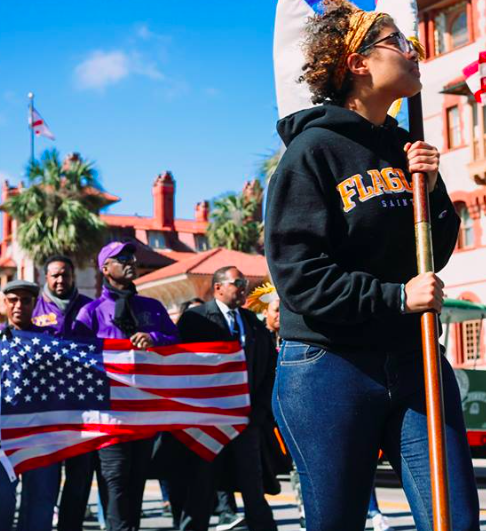By Jared Olson, photos by Katherine Lewin | gargoyle@flagler.edu

Demonstrators march in front of Flagler College on Jan. 15, 2018, Martin Luther King, Jr. Day.
Under the cold bluebird skies of Jan. 15, 2018, Martin Luther King, Jr. Day, St. Augustine demonstrators gathered in front of the squat brick walls of St. Paul African Methodist Episcopal church. The purpose: to celebrate the memory of King, a civil rights hero, in a town where he and his followers were hated, abused and jailed.
Roughly 200 demonstrators, a mix of races and ages, shivered under American flags and waited for the annual procession to begin. The route took them from the steps of the historically black church, where King spoke out against racism, to the downtown market square, where black slaves were once auctioned off.
The crowd held an air of ambiguity about the continuation of King’s legacy. Many demonstrators agreed that progress has been made in the decades since King’s death. But others believe that in light of the recent controversy surrounding Confederate monuments downtown and the economic segregation of St. Augustine, the local divide of race is still strong.
“America has fallen short of King’s legacy,” said Kenneth Jones, a local black entrepreneur. “America’s got a lot of growing to do. Racism still happens a lot in silence today. The discrimination of today is covert discrimination.”
Several caucasian demonstrators agreed with Jones’ sentiment. Ron Davis, who has lived in north Florida for most of his life, believes that Florida, and America as a whole, have not advanced as far as they should have.
“I remember when there was racism when I was a kid in Daytona Beach when it was still officially segregated. The local Dairy Queen had a segregated water fountain,” Davis said. “And I remember how, in 1971, when I went to a restaurant in Flagler Beach with my black coworker, they shut down the restaurant and refused to serve us. That was after the Civil Rights movement had happened.”
Aside from the controversial movement to remove the Confederate monuments in the downtown Plaza de la Constitucion, many have remained sharply critical of the town’s gradual “gentrification” that has resulted in the majority of the local black population being shoved into the rough West St. Augustine neighborhood.
“When you go downtown, what do you see?” Carolyn Wolf, a demonstrator, said. “Do you see a lot of interaction with our black community? Are they there? Are they welcome downtown? No.”
Half a century following Dr. King’s battle in St. Augustine, Wolf explained, social justice and racial equality has still not arrived.
“People will still be so blatant to say something to me based on the color of my skin,” said Cody Tucker, who brought his two young daughters to the demonstration. “They don’t know who I am. We always experience some kind of discrimination … people following you in stores. Police stopping you for no reason … You try not to make it affect you, you try not to be scared. But it does affect you, obviously.”
The procession passed the most prominent of the Confederate-era monuments in St. Augustine’s downtown, a towering stone obelisk engraved with the names of fallen soldiers that fought for the south in the Civil War. Seen from the street, the tall stone sculpture, erected by the “Daughters of the Confederacy” group in the 1920s, stands like a weathered gravestone. The movement to remove the two monuments, led by Rev. Ron Rawls, the leader of St. Paul AME church and the vicious backlash the movement sparked has become a flashpoint of local racial tensions.
But not all was negative on this day of remembrance. For many of the marchers, it was a celebration of a man and a movement that won great battles in fighting for the rights of minorities.
“We’re here today because MLK has a tremendous impact on us, both as black Americans, and as women,” said Nakiya Binder, a member of the Alpa Kappa Alpha sorority. “Not only was he important to fighting for civil rights, but his wife Coretta was a member of our same sorority. So in that way, we are all sisters.”
Just like the Confederate monuments in downtown St. Augustine, the memory of Dr. King also towers over the city of St. Augustine.
“He was more than just an advocate for blacks,” Jones said. “He fought for all of us. This holiday is to memorialize a man who changed the landscape of America.”



Be the first to comment on "MLK demonstrators celebrate memory of Civil Rights warrior"